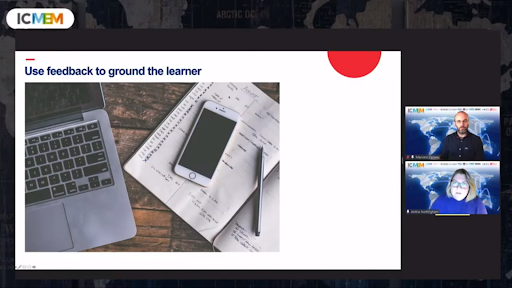The pandemic situation that has shifted offline to online learning poses challenges for students and teachers. Difficulty understanding the material, lack of focus, and distraction from the surrounding environment are some of the challenges faced by students. On the other hand, teachers’ complaints about passive students or the difficulty of developing appropriate modules online are unavoidable. Unfortunately, many methods are yet to succeed in solving this problem.
Friday (12/8/2021), the team from RMIT Online, represented by Anitra Nottingham and Marcelo Zerwes, shared appropriate strategies for utilizing technology in building online learning that focuses on experience.
“The problem with online learning is that we all end up in LMS,” said Anitra. Learning Management System (LMS) is a platform that allows students to access online materials, submit assignments and participate in the activities that support online learning. The drawback of LMS is the lack of interaction between students and teachers. It is what distinguishes online from offline learning, where students can easily interact with teachers.
So what can we do? Anitra said teaching is not just broadcasting information; there is always something more. We ask questions, see graphics and pictures, take quizzes, and so on. Teaching is an experience, not just providing information.
Even though it’s online, that doesn’t mean the challenge is impossible to overcome. Teachers can create quizzes or give assignments that make the information last longer in the student’s brain. They could also encourage them to do something, such as taking notes or sharing thoughts with friends.
The teaching and learning process can also be focused on experience-based learning. This learning method tells students everything they need to know as a series of structured steps. “In the beginning, it can be an interactive video. Then, students are directed to make something related to the material, then discuss what students have made together. Finally, students can send their assignments. “Teaching is taking students through structured series,” Anitra pointed.
Marcelo discussed the multimedia aspect, which is also an important aspect when delivering online material. In traditional online learning, we usually write the materials, then record a video explaining it, that’s all. We can see that this is less effective for improving student understanding because there are hands-on activities to do during the knowledge transfer process.
“In terms of videos and podcasts, we can produce them in various types,” said Marcelo. He shared that teachers can use various types, including interview-based, this will trigger students to think more when responding to a question. Also, the interesting one is the Enactment or roleplay of the material being discussed. It will make it easier for students to understand the material because the roles are clearly illustrated.
To conclude, we know that to get an optimal learning experience, creative ideas are needed. This online learning challenges do require teachers and students to put more effort into delivering the content. The application of experiential-based learning supported by an attractive multimedia display is believed to help answer student and teacher complaints related to online learning problems.





